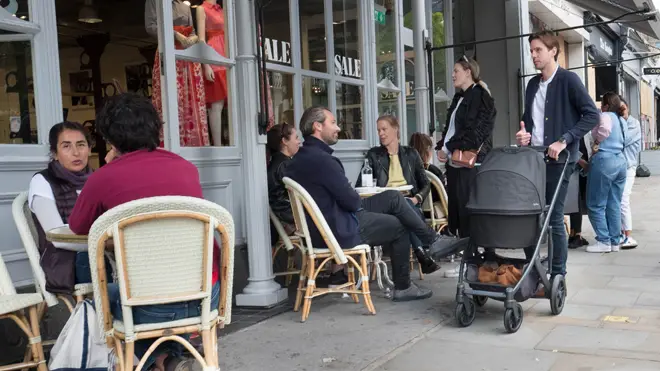
Shelagh Fogarty 1pm - 4pm
16 September 2020, 07:17 | Updated: 16 September 2020, 16:37

UK inflation fell to 0.2% in August from 1% in July - the lowest level for almost half a decade - as a result of the Eat Out to Help Out scheme, according to official figures.
The Office for National Statistics (ONS) said on Wednesday the Consumer Price Index had taken a tumble to its lowest rate since December 2015 thanks to several changes amid the pandemic, but particularly Chancellor Rishi Sunak's dining initiative.
Eat Out to Help Out, which ran through August, saw cafes and restaurants apply discounts on their meals as a part of a government scheme to encourage people to dine out again.
More than 100 million meals were eaten in line with the scheme, the most recent Treasury figures show.
READ MORE: Southend testing centre hit by 'concerning' queues

'We're in a dangerous situation now' professor speaks out on testing
A cut to VAT on hospitality and tourism from 20% to 5% also helped to lower inflation during a summer in which air fares also fell for the first time on record.
The ONS said prices had dropped 20.6% year-on-year last month as various countries were piled onto the UK's quarantine list.
This can be compared to the 22.4% rise in fares that was seen in the same month in 2019.
READ MORE: Testing, testing...Govt announces urgent review after LBC probe
Another reason for deflation, the ONS noted, comes after retailers held back from increasing prices for autumn selling season.
There was a 2% increase among retailers between July and August last year, which compares with just a 0.4% rise in 2020.
READ MORE: No coronavirus tests available in top 10 England hotspots
Jonathan Athow, deputy national statistician at the ONS, said: "The cost of dining out fell significantly in August thanks to the 'Eat Out to Help Out' scheme and VAT cut, leading to one of the largest falls in the annual inflation rate in recent years.
"For the first time since records began, air fares fell in August as fewer people travelled abroad on holiday.
"Meanwhile the usual clothing price rises seen at this time of year, as autumn ranges hit the shops, also failed to materialise."
READ MORE: Keir Starmer to miss PMQs while he waits for family member's Covid test result

James O'Brien addresses lack of testing for top 10 Covid hotspots
Deflation in economics, by definition, marks a time when there is a decrease in the general price of goods and services - and usually happens at a time of economic stagnation.
The coronavirus pandemic led to such stagnation as a number industries saw lower - or no - demand during lockdowns.
It was especially apparent in the airline industry and other travel sectors.
READ MORE: Labour challenges Government over lack of tests in Covid hotspots
Samuel Tombs, at Pantheon Macroeconomics, noted the sub-1% inflation rate was likely a trend that would be seen throughout the rest of the year as the country continues to live alongside the virus.
He said: "Firms in the services sector likely will have to absorb higher Covid-19 related costs, rather than pass them on to consumers, in the face of lingering weakness in demand.
"Accordingly, we expect the headline rate of CPI inflation to average just 0.6% in the last four months of 2020."
READ MORE: Independent SAGE member warns of 'dangerous situation' over lack of tests
The ONS figures also revealed a fall in fuel prices from an average of 113.1p per litre in August against 128.3p in 2019.
Diesel prices were at an average of 118.1p per litre last month against 132.6p a year earlier.
The CPI including owner-occupiers' housing costs (CPIH), meanwhile, was 0.5% last month, down from 1.1% in July.